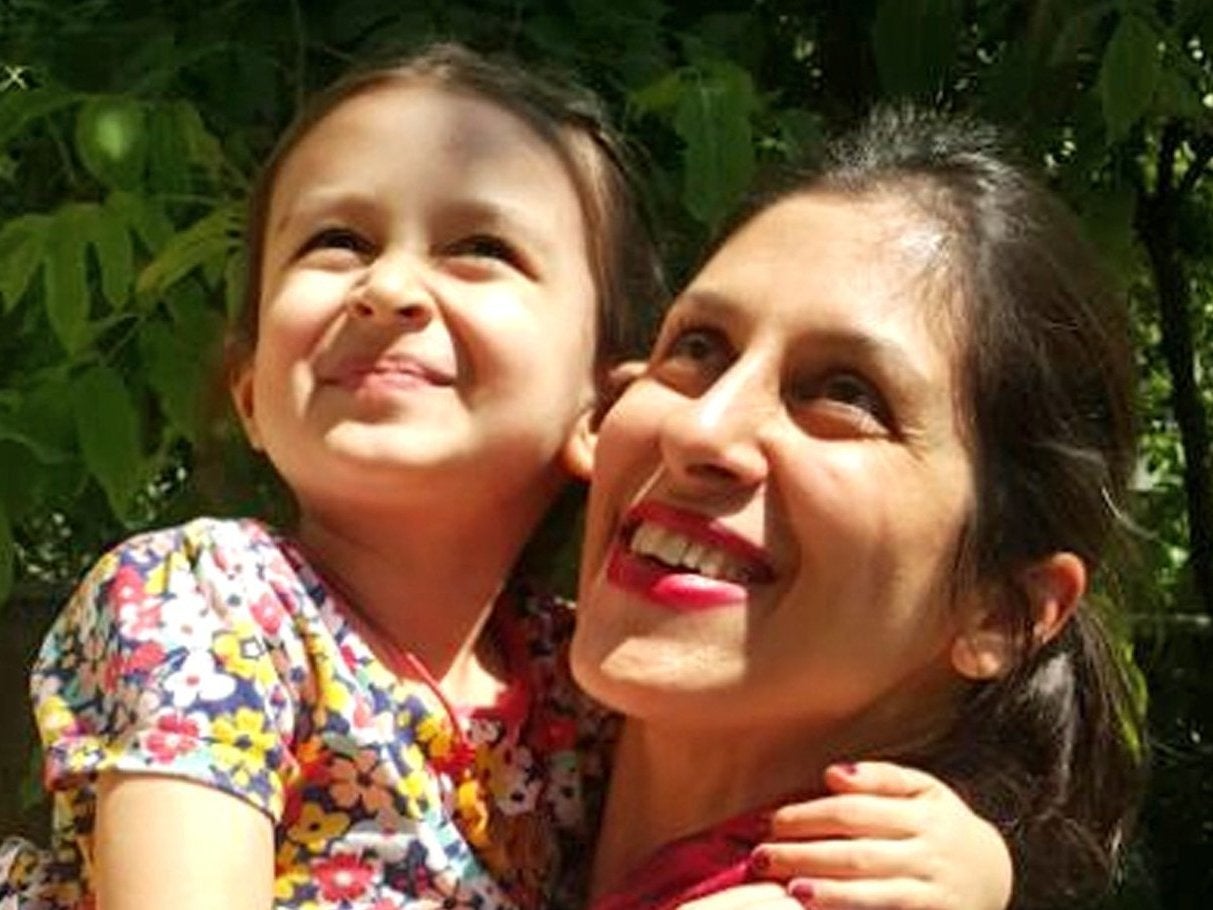Nazanin Zaghari-Ratcliffe: British woman jailed in Iran given diplomatic protection by UK
Move opens door for legal action with possibility of compensation for family

Your support helps us to tell the story
From reproductive rights to climate change to Big Tech, The Independent is on the ground when the story is developing. Whether it's investigating the financials of Elon Musk's pro-Trump PAC or producing our latest documentary, 'The A Word', which shines a light on the American women fighting for reproductive rights, we know how important it is to parse out the facts from the messaging.
At such a critical moment in US history, we need reporters on the ground. Your donation allows us to keep sending journalists to speak to both sides of the story.
The Independent is trusted by Americans across the entire political spectrum. And unlike many other quality news outlets, we choose not to lock Americans out of our reporting and analysis with paywalls. We believe quality journalism should be available to everyone, paid for by those who can afford it.
Your support makes all the difference.Britain is placing Nazanin Zaghari-Ratcliffe – the UK citizen whose jailing in Iran has become an issue of huge international controversy – under diplomatic protection, in a move expected to have a significant impact in efforts to get her freed.
The decision raises Ms Zaghari-Ratcliffe’s incarceration from a consular to a state-to-state issue and will, says foreign secretary Jeremy Hunt, oblige “Iran to fulfil its obligations under international law”. It also opens the door for legal action with the possibility of compensation if it is proved that she had been mistreated.
On a broader basis, British diplomats making representations to Tehran on behalf of Ms Zaghari-Ratcliffe, who has dual British and Iranian nationality, will no longer be doing so on behalf of just an individual, but will be acting on behalf of the British state.
The offer of diplomatic protection is a “very rare move”, with the Foreign and Commonwealth Office in London saying “the UK has not used it in recent memory”, according to an official statement.
In offering Ms Zaghari-Ratcliffe this protection, the British government holds that the legal action brought against Ms Zaghari-Ratcliffe in Iran “failed to meet Iran’s obligations under international standards” and that she “has periodically been denied access to the medical care recommended by doctors” despite assurances by the Iranian government.
Iranian officials insist that she is receiving the medical treatment necessary and that she has not suffered any abuse.
Ms Zaghari-Ratcliffe’s husband Richard, who has been campaigning in Britain for her release, has been told about the step being taken by the government. The couple have a three-year-old daughter being cared for by Ms Zaghari-Ratcliffe’s family in Tehran.
Mr Ratcliffe had in the past asked Boris Johnson, when he was foreign secretary, to declare diplomatic protection for his wife.
Any subsequent legal action taken would have to go through the International Court of Justice in The Hague. Senior diplomatic officials stressed, however, that no decision has been made about taking that path at this point.
Iran does not accept dual nationality and Tehran has repeatedly stated that Ms Zaghari-Ratcliffe is Iranian. Thus, they hold, she cannot be treated as a UK citizen, and the British government has no right to interfere with the country’s internal judicial process.
Mr Hunt acknowledged that diplomatic protection is “unlikely to be a magic wand that leads to an overnight result”, but “it demonstrates to the whole world that Nazanin is innocent and the UK will not stand by when one of its citizens is treated so unjustly”.
British government officials maintain that there is no connection between her case and that of Iran’s nuclear agreement with international powers – which Donald Trump is trying to tear up – but which Britain, along with France, Germany, Russia and China, the other signatories to the deal, is trying to preserve.
But it is hoped that France and Germany, along with other western states and the United Nations, will back the UK in taking robust steps to get Ms Zaghari-Ratcliffe freed.
Last October, Jose Antonio Guevara Bermdez, chair-rapporteur of the UN’s Working Group on Arbitrary Detention, and Asma Jahangir, special rapporteur on human rights for Iran, called for Ms Zaghari-Ratcliffe’s immediate release.
Ms Zaghari-Ratcliffe has been detained in Iran since 3 April 2016. In September that year she was sentenced to five years’ imprisonment for “plotting to topple the Iranian government”.
The prosecutor general in Tehran said that she was being held for running “a BBC Persian online journalism course which was aimed at recruiting and training people to spread propaganda against Iran”.
Ms Zaghari-Ratcliffe and her family vehemently deny the allegations.
Speaking about the exercise of diplomatic protection, Mr Hunt said that: "Nazanin Zaghari-Ratcliffe is an innocent woman who has spent the last three years in an Iranian jail, separated from her daughter and husband. We have been working hard to secure her release but despite repeated efforts have not been successful. We have not even been able to secure her the medical treatment she urgently needs despite assurances to the contrary.
“So I have today decided that the UK will take a step that is extremely unusual and exercise diplomatic protection. I have not taken this decision lightly. I have considered the unacceptable treatment Nazanin has received over three years, including not just lack of access to medical treatment but also lack of due process in the proceedings brought against her.
“My decision is an important diplomatic step which signals to Tehran that its behaviour is totally wrong. It is unlikely to be a magic wand that leads to an overnight result. But it demonstrates to the whole world that Nazanin is innocent and the UK will not stand by when one of its citizens is treated so unjustly.”
Join our commenting forum
Join thought-provoking conversations, follow other Independent readers and see their replies
Comments